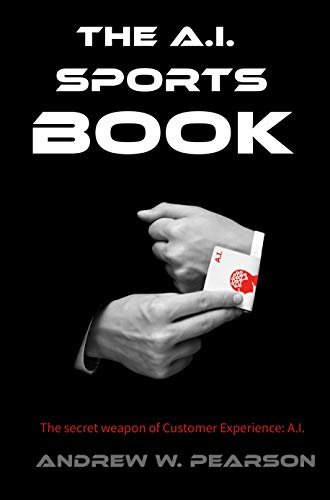Nonfiction

The A.I. Casino breaks down A.I., machine learning, and deep learning into five unique use cases—sound, time series, text, image, and video—and also reveals how marketing executives can utilize this powerful technology to help them more finely tune their marketing campaigns, better segment their customers, increase lead generation and foster strong customer loyalty.
Today, “Personalization”—the process of utilizing mobile, social, geo-location data, web morphing, context, and even affective computing to tailor messages and experiences to an individual interacting with them—is becoming the optimum word in a radically new customer intelligence environment.
The A.I. Casino explains this complex technology in simple to understand terms and then shows how marketers can utilize the psychology of personalization with A.I. to both create more effective marketing campaigns as well as increase customer loyalty. Pearson shows companies how to avoid Adobe’s warning of not using industrial-age technology in the digital era. Pearson also reveals how to create a platform of technology that seamlessly integrates EDW and real-time streaming data with social media content. Analytical models and neural nets can then be built on both commercial and open-source technology to better understand the customer, thereby strengthening the brand and, just as importantly, increasing ROI.

The A.I. Sports Book explains this complex technology in simple to understand terms and then shows how sports book marketers can utilize the psychology of personalization with A.I. to both create more effective marketing campaigns as well as increase customer loyalty. Pearson shows companies how to avoid Adobe’s warning of not using industrial-age technology in the digital era. Pearson also reveals how to create a platform of technology that seamlessly integrates EDW and real-time streaming data with social media content. Analytical models and neural nets can then be built on both commercial and open source technology to better understand the customer, thereby strengthening the brand and, just as importantly, increasing ROI.
The A.I. Sports Book reveals how these and other technologies can help shape the customer journey. The book details how the five types of analytics—descriptive, diagnostic, predictive, prescriptive, and edge analytics—affect not only the customer journey, but also just about every operating function in a sports book. An IoT-connected sports book can make its operations smart. Connected devices can help with inventory optimization, labor management, marketing, and customer experience, as well as keep its data centers green and its energy use smart. Social media is no longer a vanity platform, but rather it is a place to both connect with current customers as well as court new ones.

The A.I. Marketer breaks down A.I., machine learning, and deep learning into five unique use cases—sound, time series, text, image, and video—and also reveals how marketing executives can utilize this powerful technology to help them more finely tune their marketing campaigns, better segment their customers, increase lead generation and foster strong customer loyalty. Today, “Personalization”—the process of utilizing mobile, social, geo-location data, web morphing, context, and even affective computing to tailor messages and experiences to an individual interacting with them—is becoming the optimum word in a radically new customer intelligence environment.
The A.I. Marketer explains this complex technology in simple to understand terms and then shows how marketers can utilize the psychology of personalization with A.I. to both create more effective marketing campaigns as well as increase customer loyalty. Author Andrew Pearson shows companies how to avoid Adobe’s prescient warning that companies can't use industrial-age technology in the digital era. Pearson also reveals how to create a platform of technology that seamlessly integrates EDW and real-time streaming data with social media content. Analytical models and neural nets can then be built on both commercial and open-source technology to better understand the customer, thereby strengthening the brand and, just as importantly, increasing ROI.

The A.I. Retailer breaks down A.I., machine learning, and deep learning into five unique use cases—sound, time series, text, image, and video—and also reveals how marketing executives can utilize this powerful technology to help them more finely tune their marketing campaigns, better segment their customers, increase lead generation, and foster strong customer loyalty.
Today, “Personalization”—the process of utilizing mobile, social, geo-location data, web morphing, context and even affective computing to tailor messages and experiences to an individual interacting with them—is becoming the optimum word in a radically new customer intelligence environment. The A.I. Retailer explains this complex technology in simple to understand terms and then shows how marketers can utilize the psychology of personalization with A.I. to both create more effective marketing campaigns as well as increase customer loyalty.
Pearson shows companies how to avoid Adobe’s warning of not using industrial-age technology in the digital era. Pearson also reveals how to create a platform of technology that seamlessly integrates an EDW and real-time streaming data with social media content. Analytical models and neural nets can then be built on both commercial and open source technology to better understand the customer, thereby strengthening the brand and, just as importantly, increasing ROI.

The A.I. Hotelier breaks down A.I., machine learning, and deep learning into five unique use cases—sound, time series, text, image, and video—and also reveals how hotel marketing executives can utilize this powerful technology to help them more finely tune their marketing campaigns, better segment their customers, increase lead generation, and foster on strong customer loyalty. Today, “Personalization”—the process of utilizing mobile, social, geo-location data, web morphing, context and even affective computing to tailor messages and experiences to an individual interacting with them—is becoming the optimum word in a radically new customer intelligence environment. The A.I. Hotelier explains this complex technology in simple to understand terms and then shows how marketers can utilize the psychology of personalization with A.I. to both create more effective marketing campaigns as well as increase customer loyalty.